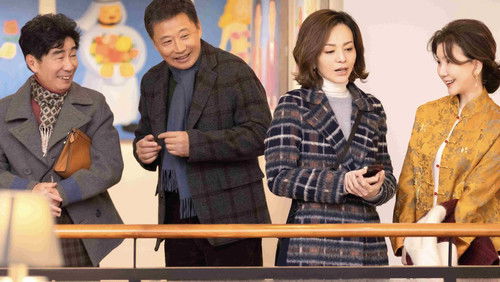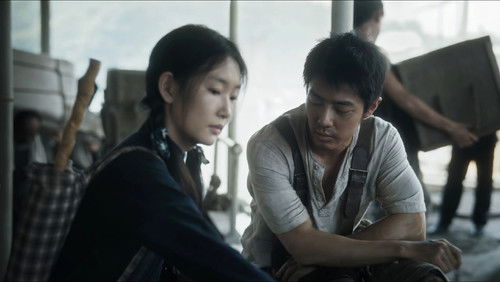That Brennan Girl (1946)
19KThat Brennan Girl: Directed by Alfred Santell. With James Dunn, Mona Freeman, William Marshall, June Duprez. The film begins on Mother’s Day 1938 when 14-year-old Ziggy Brennan (Mona Freeman) buys a gardenia for her mother. Ziggy’s youthful exuberance disappears when she enters their apartment and finds her mother Natalie (June Duprez) drinking with a strange man. Natalie introduces Ziggy as her “sister” and quietly cautions Ziggy against calling her “mother.” Later, dispensing some motherly advice, Natalie tells Ziggy that if she learns all the tricks, she’ll never need to work for a living. Ziggy goes right out and applies parts of this advice by stealing a valuable lapel pin from a fellow high-school student, and is promptly expelled from school. About five years later, Ziggy has made progress and meets Denny Reagan (James Dunn), who persuades her to go into his racket. Ziggy’s role is to telephone people who are planning to move and make arrangements to provide a truck to move the furniture. The departing truck is the last that the owners see of their furniture as it is taken to a warehouse and sold by Denny and his gang. Hanging out in a nightclub one evening, circa 1943, the still-underage Ziggy flirts with a young naval officer from Minnesota, Mart Neilson (William Marshall), who promptly falls in love with her and proposes marriage. To ensure that Mart knows her background, Ziggy introduces him to Natalie (at her worst), but Mart still insists on the marriage. Shortly after the wedding ceremony, Mart is shipped out to war-duty and is killed in action. Ziggy learns that she is expecting a baby, while the law catches up to Denny and ships him out to prison. Ziggy is still living with her mother but Natalie, horrified at the prospect of being a grandmother, kicks her out and Ziggy moves into Mrs. Merryman’s (Rosalind Ivan) boardinghouse. Ziggy has the baby and some time passes, circa 1944-45, and Ziggy–still making her nightclub rounds–runs into the just-paroled Denny. This Denny is a new-and-thoughtful version, and he does not approve of Ziggy leaving her baby with a sitter while she makes her rounds. Denny shows great interest in the baby and sees more and more of Ziggy. Returning from a date, Ziggy finds the baby’s crib vacant. In her absence the babysitter had gone out to her boyfriend’s car for some heavy necking and the baby had almost choked to death before being discovered by Mrs. Merryman, who promptly called the police. At the trial, the babysitter denies responsibility (negligence-of-duty) and Ziggy loses custody of her baby. The new-and-thoughtful Denny will have nothing to do with Ziggy, although his mother, knowing that Denny and Ziggy really love each other, tries to bring them together–but Ziggy has disappeared. Having moved to another boardinghouse, she drops by a church and finds an abandoned baby. Denny finds her and the baby sunning in a park and is impressed and thinks she’s become the perfect mother. With Denny’s help, Ziggy appeals her case to regain custody of her own child, and when the judge learns that she has been caring for an abandoned baby, he is much impressed and returns her own infant to her.
“The director Alfred Santell remains rather mysterious; his output ranging from moody black u0026amp; white adaptations of Maxwell Anderson and Eugene Ou0026#39;Neill to Technicolor nonsense with Dorothy Lamour. A lot of people who consider themselves knowledgable about films have never heard of him. In 1946 he was considered important enough to include in the appendix at the back of Roger Manvellu0026#39;s u0026#39;Filmu0026#39;, but twenty years later, despite still being alive, both he and this film (his last after breaking with Republic over a contract dispute in 1947) had fallen through the cracks in film history sufficiently to be omitted from both Andrew Sarrisu0026#39;s u0026#39;American Cinemau0026#39; and Maltinu0026#39;s u0026#39;TV Moviesu0026#39;.u003cbr/u003eu003cbr/u003eDespite the twee title, it deserves consideration alongside other shoestring Republic u0026#39;artu0026#39; movies like Orson Wellesu0026#39; u0026#39;Macbethu0026#39; and Frank Borzageu0026#39;s u0026#39;Moonriseu0026#39;, stylishly shot by Jack Marta (for whom it must have been a stimulating change from westerns), with an eccentric score by George Antheil and attractive lead performances by Mona Freeman and James Dunn (whose last lead this was, fifteen years after being launched by Borzage in the latteru0026#39;s Oscar-winning u0026#39;Bad Girlu0026#39;).”









